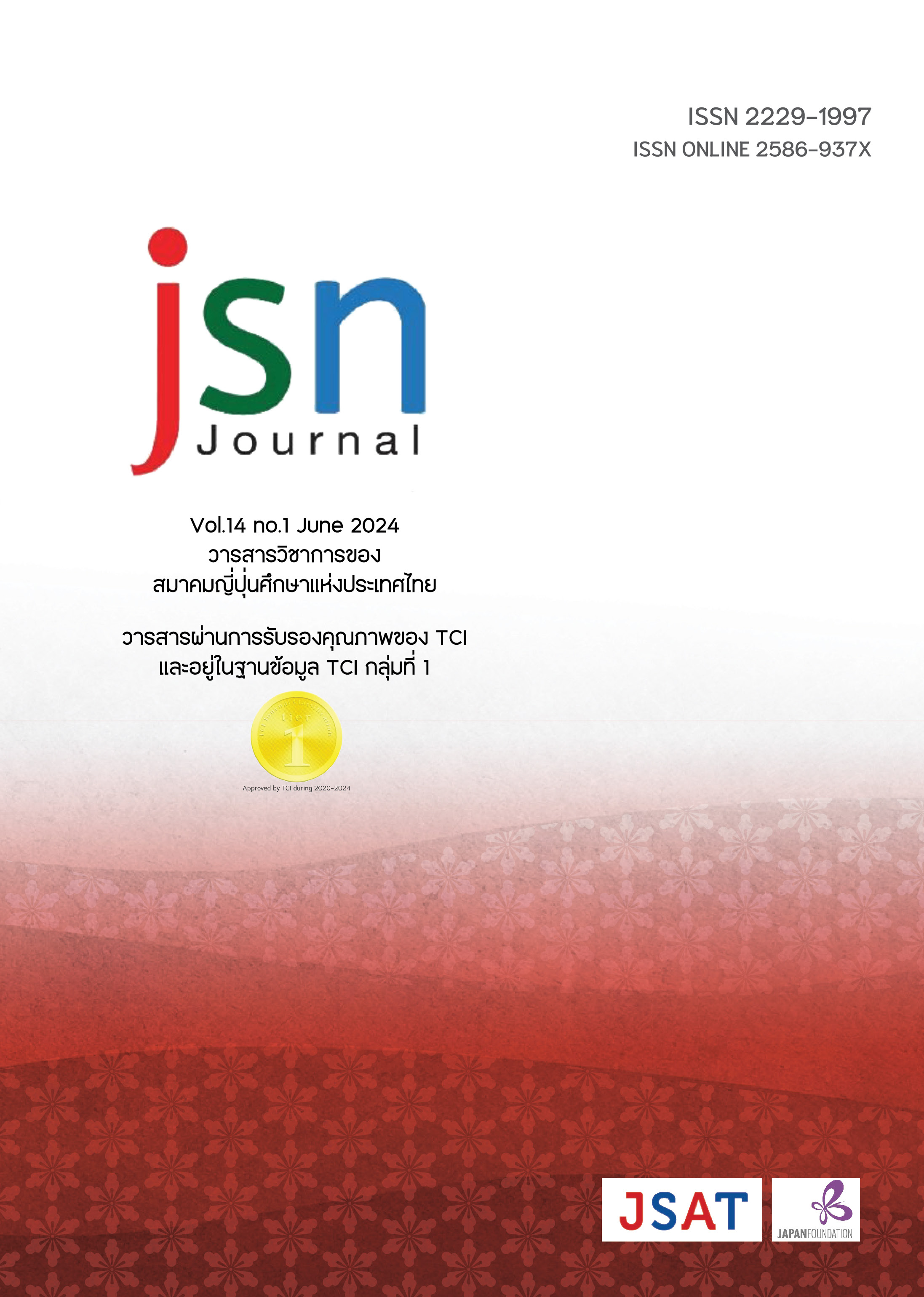The Assessment of Students’ Proficiencies According to the Waseda University Standard Framework After Studying Basic Japanese for the Care Workers Course Through Role-play Activities in Online Media
Main Article Content
Abstract
The purpose of this research article was to study the knowledge and ability of students according to Waseda University’s standard framework. The sample group comprised fifteen 2nd year-university students who were taking basic Japanese for care workers, who were also given role-play activities in online media. Data was collected through a competency questionnaire adapted from Waseda University’s standard framework based on the perspective of students and teachers. The results of this research revealed that the students received reading, speaking, and listening scores at 7.73/25, 8.33/20, and 5.53/20 respectively in during the pre-test. During the post-test, the students received scores of 10.8/25, 11.45/20, and 8.6/20 respectively. Finally, the scores after the roleplay activities, increased to 14.8/25, 14.33/20, and 10.30/20 respectively. In addition, the students evaluated their self-efficacy according to Waseda University’s standard framework. There was a total of five levels. At Level 1, the students evaluated their listening skills at the most among other skills. At Level 2, the students evaluated their speaking skills as the highest. At Level 3, the students evaluated their listening skills as the highest. At Level 4, the students evaluated their reading skills as the highest and, at Level 5, the students assessed the speaking skills as the highest. Writing skills were deemed as the lowest evaluated skill based on the students’ assessment. According to the teacher’ comments, it was found that the students had limited ability in listening, speaking, and reading vocabulary; and the writing ability was at a minimal. Finally, the students suggested utilizing learning tools from media such as CDs and videos to enhance their listening skills. Additionally, more activities were also suggested to further develop the speaking skills. It was also suggested to use real documents for practicing reading and to practice specific Kanji writing. All of these suggestions will be useful to the future teaching of the Care Workers course.
Article Details

This work is licensed under a Creative Commons Attribution-NonCommercial-NoDerivatives 4.0 International License.
ข้อความและข้อคิดเห็นต่างๆ ในบทความเป็นของผู้เขียนบทความนั้นๆ ไม่ใช่ความเห็นของกองบรรณาธิการหรือของวารสาร jsn Journal
References
กมลาสน์ กีรตินันท์วัฒนา. (2565). ความพึงพอใจของนักศึกษาและความคิดเห็นอาจารย์ต่อวิชาภาษาญี่ปุ่นพื้นฐานเพื่อการบริบาลผู้สูงอายุในระดับมหาวิทยาลัยผ่านการเรียนรู้และฝึกปฏิบัติจริง. ใน Proceeding of the 16th JSAT Annual Conference 2022 17-18 November 2022 “Think Global Live Local for Sustainable Multi-cultural Society” เอกสารหลังการประชุมวิชาการระดับชาติ สมาคมญี่ปุ่นศึกษาแห่งประเทศไทย ครั้งที่ 16 (น.10-21). สมาคมญี่ปุ่นศึกษาแห่งประเทศไทย.
กระทรวงศึกษาธิการ. (2561). รายงานการศึกษาไทย พ.ศ.2561. กรุงเทพฯ: พริกหวานกราฟฟิค.
ธิดาพร รอดทุกข์. (2550). ผลของเทคนิคสถานการณ์จำลองที่มีต่อทักษะการพูดภาษาอังกฤษเพื่อการสื่อสารและเชาวน์อารมณ์ของนักเรียนชั้นมัธยมศึกษาปีที่ 2 ที่มีเจตคติต่อวิชาภาษาอังกฤษต่างกัน. วารสารสงขลานครินทร์ ฉบับสังคมศาสตร์และมนุษยศาสตร์, 16(4), 659-678.
สุณีย์รัตน์ เนียรเจริญสุข. (2021). การวิเคราะห์ข้อผิดในงานเขียนภาษาญี่ปุ่นของผู้เรียนชาวไทยชั้นต้น. วารสารศิลปศาสตร์มหาวิทยาลัยธรรมศาสตร์, 21(2), 1-29.
สุพรรษา สภาชัย และ วิไลภรณ์ ฤทธิ์คุปต์. (2564). การพัฒนาหลักสูตรการฟังและการพูดภาษาญี่ปุ่นพื้นฐานเพื่อการบริบาลผู้สูงอายุ. วารสารการวิจัยกาสะลอง,15(1), 11-21.
Ahsana, A. (2018). The Influence of using Role play Towards Students’Speaking ability at the Eighth grade of Mts Riyadhul Mubtadi’ien Waylima Pesawaran in 2017/2018 Academic Year [Bachelors’ dissertation, UIN Raden Intan Lampung] UIN Raden Intan Lampung Repository http://repository.radenintan.ac.id/id/eprint/5108
Al Arif, T. Z. Z. (2019). The use of social media for English language learning: An exploratory study of EFL university students.Journal of English Language. Literature, and Teaching, 3(2), 224-233.
Arifin, Z., & Rosnija, E. (2013). Teaching speaking ability through role play. Jurnal Pendidikan dan Pembelajaran Khatulistiwa (JPPK), 2(1). 1-14.
Islam, P., & Islam, T. (2012). Effectiveness of role play in enhancing the speaking skill of the learners in a large classroom: An investigation of tertiary level students. Stamford Journal of English, 7, 218–233.
Japan foundation. (2023). JFT Basic 日本語基礎テスhttps://www.jpf.go.jp/jft-basic/th/support/support.html
Kemmis, S.,McTaggart, R.,Nixon, R. (2014). The action research planner,Singapore: Springer.
Livingstone, C. (1983). Role Play in Language Learning.Singapore: Longman.
Pohan, S. (2020). The use of digital storytelling activities for enhancing EFL university students’ ability and self-directed learning [Doctoral’ dissertation, Phayao University] University of Phayao Digital Collections http://www.updc.clm.up.ac.th/handle/123456789/1352?locale=th
Sumpana. (2010). Improving the Students’Speaking Skill by Role Play. [Master’s Thesis, Muhammadiyah University of Surakarta]. Muhammadiyah University of Surakarta Repository. http://eprints.ums.ac.id/18989/10/MINI_THESIS.pdf
Van Ments, M. (1999). The effective use of role-play: Practical techniques for improving learning. London: Kogan Page Publishers.
Wongsa, M., & Son, J. (2020). Enhancing Thai secondary school Students’ English speaking skills, attitudes and motivation with drama-based activities and Facebook. Innovation in Language Learning and Teaching, 15(2), 103-194. DOI:10.1080/17501229.2020.1853134
Xiuwen, Z., & Razali, A. B. (2021). An overview of the utilization of TikTok to improve oral English communication competence among EFL undergraduate students. Universal Journal of Educational Research, 9(7), 1439-1451.
Zaitun, Z., Hadi, M. S., & Indriani, E. D. (2021). TikTok as a Media to Enhancing the Speaking Skills of EFL Student's. Jurnal Studi Guru Dan Pembelajaran,4(1), 89-94.
岡部麻美子•鎭目怜子•向井あけみ (2017).『介護スタッフのための声かけ表現集』東京: キャプラ株式会社.
加藤真実子•奥村恵子•生出亜希 (2019).『介護の日本語1年生』 東京: 光邦株式会社.
後藤由美子•中村亜記 (2007).「わが国の介護労働の方向性-外国人介護士受け入れ意向調査から-」『羽衣国際大学人間生活学部紀要』2,1-10.
澤田幸子•中村倫子•牧野昭子•矢谷久美子•渡部真田美 (2019).『場面から学ぶ介護の日本語』 東京:倉敷印刷株式会社.
佐野正子 (2021).「自動車整備専門学校における二字漢字語学習の効率化に関する一考察 :「複合名詞」中の二字漢字語の学習優先順位」『一橋日本語教育研究会』9,15-29. https://hermes-ir.lib.hit-u.ac.jp/hermes/ir/re/71521/?lang=1
西郡仁朗 (2019).「介護福祉の日本語教育の現状と支援者の育成―介護の日本語 Can-do ステートメントを中心に―」『日本語教育』172,18-32.
公益社団法人 日本介護福祉士会 (2023, October 14).「介護の特定技能評価試験」https://www.jaccw.or.jp/projects/chousakenkyu/2019
宮崎理司•中野玲子•早川直子•奥村恵子 (2017). 『外国人介護識への日本語教育法』東京: 図書印刷 株式会社.
守岡みのり (2019).「介護分野の外国人技能実習生における日本語使用意識の変化とその要因: 実習生のインタビュー調査から」『北海学園学術情報リポジトリ』,126-145.


